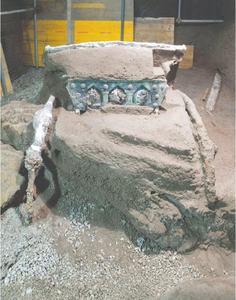ROME: An ornate Roman chariot has been discovered “almost intact” near Italy’s buried city of Pompeii, the archaeological park announced on Saturday, calling it a discovery with “no parallel” in the country.
The four-wheeled processional carriage was found in the portico to stables where the remains of three horses were unearthed in 2018, including one still in its harness.
Pompeii was buried in boiling lava when Mount Vesuvius erupted in 79 AD, killing between 2,000 and 15,000 people.
“A large ceremonial chariot with four wheels, along with its iron components, beautiful bronze and tin decorations, mineralised wood remains and imprints of organic materials (from the ropes to the remains of floral decoration), has been discovered almost intact,” a statement issued by the archaeological park said.
“This is an exceptional discovery… which has no parallel in Italy thus far — in an excellent state of preservation.” The excavation site is known as the Civita Giuliana, a suburban villa that lies just a few hundred metres from the ancient city of Pompeii.
The excavation is part of a programme aimed at fighting illegal activity in the area, including tunnel digging to reach artefacts that can be sold on illicit markets.
Looters missed the room where the chariot had lain for almost 2,000 years, tunnelling by on both sides, the park’s statement said.
Specialists took great care to unearth the vehicle, for example by pouring plaster into voids “to preserve the imprint of any organic material” that had decomposed, it added.
The park said this had allowed it to emerge well preserved down to the imprints of ropes, “thus revealing the chariot in all of its complexity”.
“Pompeii continues to amaze with all of its discoveries, and it will continue to do so for many years yet, with 20 hectares (50 acres) still to be excavated,” Culture Minister Dario Franceschini was quoted as saying.
